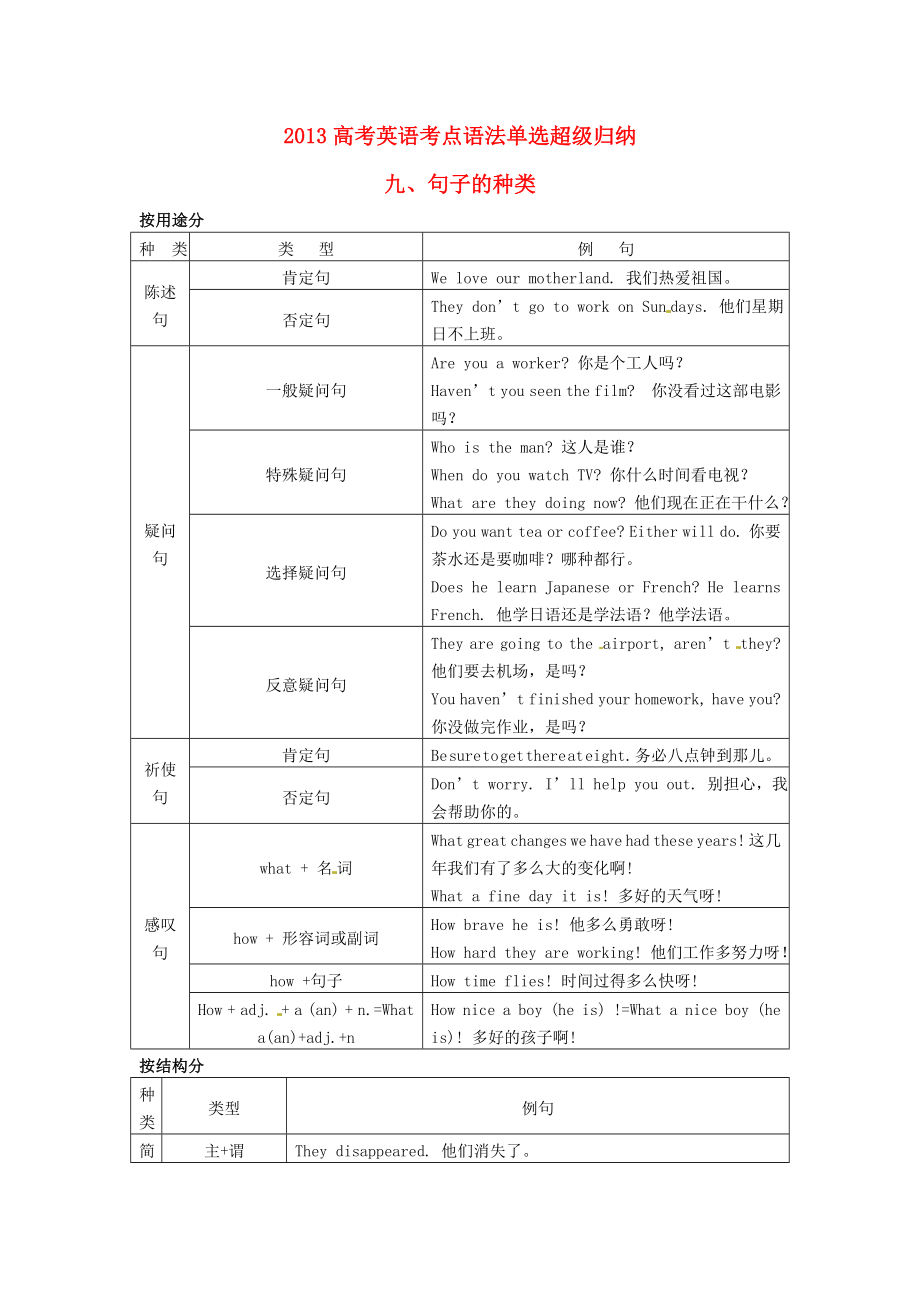《2013屆高考英語(yǔ) 考點(diǎn)語(yǔ)法歸納復(fù)習(xí)題9》由會(huì)員分享��,可在線閱讀�,更多相關(guān)《2013屆高考英語(yǔ) 考點(diǎn)語(yǔ)法歸納復(fù)習(xí)題9(3頁(yè)珍藏版)》請(qǐng)?jiān)谘b配圖網(wǎng)上搜索。
1�����、2013高考英語(yǔ)考點(diǎn)語(yǔ)法單選超級(jí)歸納
九�、句子的種類
按用途分
種 類
類 型
例 句
陳述句
肯定句
We love our motherland. 我們熱愛祖國(guó)。
否定句
They don’t go to work on Sundays. 他們星期日不上班�。
疑問(wèn)句
一般疑問(wèn)句
Are you a worker? 你是個(gè)工人嗎?
Haven’t you seen the film? 你沒看過(guò)這部電影嗎�����?
特殊疑問(wèn)句
Who is the man? 這人是誰(shuí)��?
When do you watch TV? 你什么時(shí)間看電視?
What are
2�、 they doing now? 他們現(xiàn)在正在干什么?
選擇疑問(wèn)句
Do you want tea or coffee? Either will do. 你要茶水還是要咖啡���?哪種都行。
Does he learn Japanese or French? He learns French. 他學(xué)日語(yǔ)還是學(xué)法語(yǔ)�?他學(xué)法語(yǔ)。
反意疑問(wèn)句
They are going to the airport, aren’t they? 他們要去機(jī)場(chǎng)���,是嗎���?
You haven’t finished your homework, have you? 你沒做完作業(yè),是嗎����?
祈使句
肯定句
Be s
3、ure to get there at eight. 務(wù)必八點(diǎn)鐘到那兒���。
否定句
Don’t worry. I’ll help you out. 別擔(dān)心����,我會(huì)幫助你的�。
感嘆句
what + 名詞
What great changes we have had these years! 這幾年我們有了多么大的變化啊!
What a fine day it is! 多好的天氣呀!
how + 形容詞或副詞
How brave he is! 他多么勇敢呀!
How hard they are working! 他們工作多努力呀�!
how +句子
How time flies!
4�����、時(shí)間過(guò)得多么快呀!
How + adj. + a (an) + n.=What a(an)+adj.+n
How nice a boy (he is) !=What a nice boy (he is)! 多好的孩子啊!
按結(jié)構(gòu)分
種類
類型
例句
簡(jiǎn)單句
主+謂
They disappeared. 他們消失了�����。
主+謂+賓
He likes swimming.他喜歡游泳����。
We help each other. 我們互相幫助。
主+謂+間賓+直接賓
I told my friend the good news. 我把好消息告訴了我的朋友����。
They sent u
5、s a telegram. 他們給我們拍了電報(bào)�����。
主+謂+賓+賓補(bǔ)
They named the boy Jack. 他們給孩子起名叫杰克����。
I want everything ready by eight o’clock. 我要求一切都要在八點(diǎn)前準(zhǔn)備好。
主+系+表
She is a university student. 她是一名大學(xué)生�。
He has become a pilot. 他已成為一名飛行員��。
并列句
并列關(guān)系and, not only…but also, neither …nor, both…and, not…but,
Either?you?do?it,?o
6�����、r?I?ask?for?somebody?else?to?do?it.?要么你來(lái)做���,要么我請(qǐng)其他人來(lái)做�����。
?Neither?Tom?nor?Jack?has?finished?the?homework.?湯姆和杰克都沒有完成作業(yè)��。?
Not?couldn’t?they?complete?the?task,?but?the?task?was?too?tough.?
不是他們完不成任務(wù)����,而是任務(wù)太重了。?
轉(zhuǎn)折關(guān)系but,while(而����,盡管)
nevertheless(然而;不過(guò))
John?likes?playing?basketball,?but?he?didn’t?play?i
7����、t?yesterday.?約翰喜歡打籃球���,但他昨天沒打。
選擇關(guān)系or, otherwise or else, either…or
We must hurry, or we’ll miss the train. 我們必須快點(diǎn)�����,否則會(huì)趕不上火車�����。
Either you come to my place or I go to yours. 或者你到我這兒來(lái)����,或者我到你那去。
因果關(guān)系for, so, thus, therefore, and so
We had better stay at home, for it was raining. 我們最好呆在家里�����,因?yàn)樘煺谙掠辍?
He didn’t work hard, therefore he failed in the examination.
他學(xué)習(xí)不努力���,因此這次考試不及格���。
復(fù)合句
由一個(gè)主句和一個(gè)或一個(gè)以上的從句構(gòu)成的句子叫復(fù)合句。在復(fù)合句中主句是全句的主體,從句是全句的一個(gè)成分���,不能獨(dú)立���。
從句有:名詞性從句(主語(yǔ)從句,表語(yǔ)從句���,賓語(yǔ)從句和同位語(yǔ)從句)
狀語(yǔ)從句
定語(yǔ)從句
(詳細(xì)請(qǐng)看以下各節(jié)羅列的內(nèi)容)
 2013屆高考英語(yǔ) 考點(diǎn)語(yǔ)法歸納復(fù)習(xí)題9
2013屆高考英語(yǔ) 考點(diǎn)語(yǔ)法歸納復(fù)習(xí)題9

